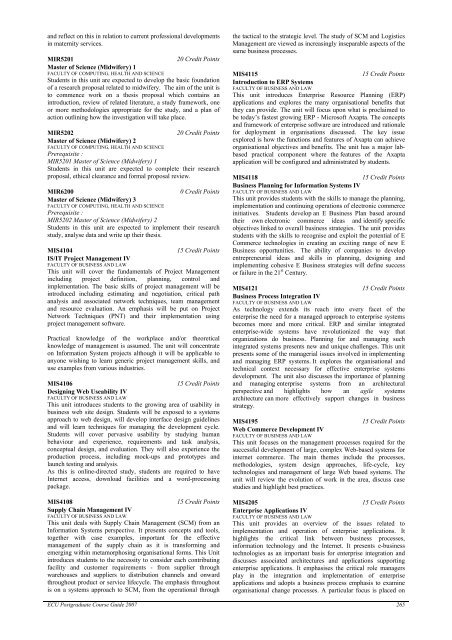Course Guide - Edith Cowan University
Course Guide - Edith Cowan University
Course Guide - Edith Cowan University
You also want an ePaper? Increase the reach of your titles
YUMPU automatically turns print PDFs into web optimized ePapers that Google loves.
and reflect on this in relation to current professional developments<br />
in maternity services.<br />
MIR5201<br />
20 Credit Points<br />
Master of Science (Midwifery) 1<br />
FACULTY OF COMPUTING, HEALTH AND SCIENCE<br />
Students in this unit are expected to develop the basic foundation<br />
of a research proposal related to midwifery. The aim of the unit is<br />
to commence work on a thesis proposal which contains an<br />
introduction, review of related literature, a study framework, one<br />
or more methodologies appropriate for the study, and a plan of<br />
action outlining how the investigation will take place.<br />
MIR5202<br />
20 Credit Points<br />
Master of Science (Midwifery) 2<br />
FACULTY OF COMPUTING, HEALTH AND SCIENCE<br />
Prerequisite :<br />
MIR5201 Master of Science (Midwifery) 1<br />
Students in this unit are expected to complete their research<br />
proposal, ethical clearance and formal proposal review.<br />
MIR6200<br />
0 Credit Points<br />
Master of Science (Midwifery) 3<br />
FACULTY OF COMPUTING, HEALTH AND SCIENCE<br />
Prerequisite :<br />
MIR5202 Master of Science (Midwifery) 2<br />
Students in this unit are expected to implement their research<br />
study, analyse data and write up their thesis.<br />
MIS4104<br />
15 Credit Points<br />
IS/IT Project Management IV<br />
FACULTY OF BUSINESS AND LAW<br />
This unit will cover the fundamentals of Project Management<br />
including project definition, planning, control and<br />
implementation. The basic skills of project management will be<br />
introduced including estimating and negotiation, critical path<br />
analysis and associated network techniques, team management<br />
and resource evaluation. An emphasis will be put on Project<br />
Network Techniques (PNT) and their implementation using<br />
project management software.<br />
Practical knowledge of the workplace and/or theoretical<br />
knowledge of management is assumed. The unit will concentrate<br />
on Information System projects although it will be applicable to<br />
anyone wishing to learn generic project management skills, and<br />
use examples from various industries.<br />
MIS4106<br />
15 Credit Points<br />
Designing Web Useability IV<br />
FACULTY OF BUSINESS AND LAW<br />
This unit introduces students to the growing area of usability in<br />
business web site design. Students will be exposed to a systems<br />
approach to web design, will develop interface design guidelines<br />
and will learn techniques for managing the development cycle.<br />
Students will cover pervasive usability by studying human<br />
behaviour and experience, requirements and task analysis,<br />
conceptual design, and evaluation. They will also experience the<br />
production process, including mock-ups and prototypes and<br />
launch testing and analysis.<br />
As this is online-directed study, students are required to have<br />
Internet access, download facilities and a word-processing<br />
package.<br />
MIS4108<br />
15 Credit Points<br />
Supply Chain Management IV<br />
FACULTY OF BUSINESS AND LAW<br />
This unit deals with Supply Chain Management (SCM) from an<br />
Information Systems perspective. It presents concepts and tools,<br />
together with case examples, important for the effective<br />
management of the supply chain as it is transforming and<br />
emerging within metamorphosing organisational forms. This Unit<br />
introduces students to the necessity to consider each contributing<br />
facility and customer requirements - from supplier through<br />
warehouses and suppliers to distribution channels and onward<br />
throughout product or service lifecycle. The emphasis throughout<br />
is on a systems approach to SCM, from the operational through<br />
the tactical to the strategic level. The study of SCM and Logistics<br />
Management are viewed as increasingly inseparable aspects of the<br />
same business processes.<br />
MIS4115<br />
15 Credit Points<br />
Introduction to ERP Systems<br />
FACULTY OF BUSINESS AND LAW<br />
This unit introduces Enterprise Resource Planning (ERP)<br />
applications and explores the many organisational benefits that<br />
they can provide. The unit will focus upon what is proclaimed to<br />
be today’s fastest growing ERP - Microsoft Axapta. The concepts<br />
and framework of enterprise software are introduced and rationale<br />
for deployment in organisations discussed. The key issue<br />
explored is how the functions and features of Axapta can achieve<br />
organisational objectives and benefits. The unit has a major labbased<br />
practical component where the features of the Axapta<br />
application will be configured and administrated by students.<br />
MIS4118<br />
15 Credit Points<br />
Business Planning for Information Systems IV<br />
FACULTY OF BUSINESS AND LAW<br />
This unit provides students with the skills to manage the planning,<br />
implementation and continuing operations of electronic commerce<br />
initiatives. Students develop an E Business Plan based around<br />
their own electronic commerce ideas and identify specific<br />
objectives linked to overall business strategies. The unit provides<br />
students with the skills to recognise and exploit the potential of E<br />
Commerce technologies in creating an exciting range of new E<br />
Business opportunities. The ability of companies to develop<br />
entrepreneurial ideas and skills in planning, designing and<br />
implementing cohesive E Business strategies will define success<br />
or failure in the 21 st Century.<br />
MIS4121<br />
15 Credit Points<br />
Business Process Integration IV<br />
FACULTY OF BUSINESS AND LAW<br />
As technology extends its reach into every facet of the<br />
enterprise the need for a managed approach to enterprise systems<br />
becomes more and more critical. ERP and similar integrated<br />
enterprise-wide systems have revolutionized the way that<br />
organizations do business. Planning for and managing such<br />
integrated systems presents new and unique challenges. This unit<br />
presents some of the managerial issues involved in implementing<br />
and managing ERP systems. It explores the organisational and<br />
technical context necessary for effective enterprise systems<br />
development. The unit also discusses the importance of planning<br />
and managing enterprise systems from an architectural<br />
perspective and highlights how an agile systems<br />
architecture can more effectively support changes in business<br />
strategy.<br />
MIS4195<br />
15 Credit Points<br />
Web Commerce Development IV<br />
FACULTY OF BUSINESS AND LAW<br />
This unit focuses on the management processes required for the<br />
successful development of large, complex Web-based systems for<br />
internet commerce. The main themes include the processes,<br />
methodologies, system design approaches, life-cycle, key<br />
technologies and management of large Web based systems. The<br />
unit will review the evolution of work in the area, discuss case<br />
studies and highlight best practices.<br />
MIS4205<br />
15 Credit Points<br />
Enterprise Applications IV<br />
FACULTY OF BUSINESS AND LAW<br />
This unit provides an overview of the issues related to<br />
implementation and operation of enterprise applications. It<br />
highlights the critical link between business processes,<br />
information technology and the Internet. It presents e-business<br />
technologies as an important basis for enterprise integration and<br />
discusses associated architectures and applications supporting<br />
enterprise applications. It emphasises the critical role managers<br />
play in the integration and implementation of enterprise<br />
applications and adopts a business process emphasis to examine<br />
organisational change processes. A particular focus is placed on<br />
ECU Postgraduate <strong>Course</strong> <strong>Guide</strong> 2007 265



